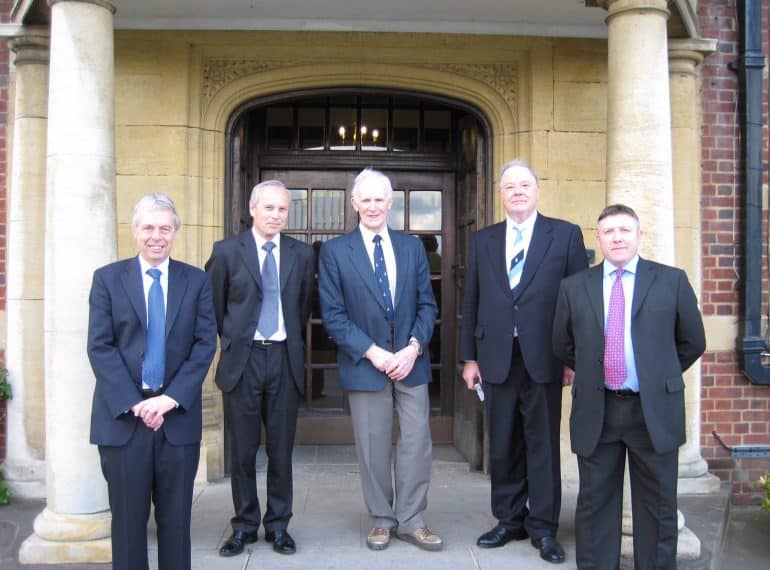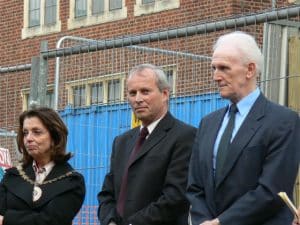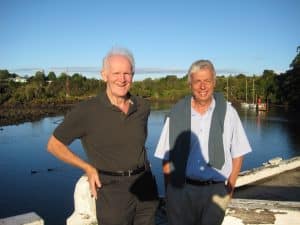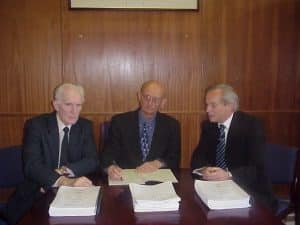Teacher, Governor and Trustee who “leaves a wonderful legacy”: Sid Clark (1933-2021)

Leading figures from the QE community today paid tribute to Sid Clark, an important figure at the School for half a century, who died this week.
Appointed as a Chemistry teacher in 1956, Mr Clark went on to play a significant role in maintaining standards at QE through some of the School’s most turbulent years and, before his retirement in 1987, helped newly arrived Headmaster Eamonn Harris in laying the groundwork for its subsequent success.
Having made a huge impact in his staff roles, among them Head of Chemistry and Head of Sixth Form, Mr Clark (pictured, centre, above) continued to serve the School in retirement, as a Governor, and as a Trustee of the Friends of Queen Elizabeth’s, who, together with Mr Harris, set up its covenant scheme.
Headmaster Neil Enright said: “Sid made a truly significant contribution to our School during a long and distinguished period of service. The FQE covenant scheme, with which he was so involved, has formed the foundations for the ongoing transformation of the School site, allowing us to provide ever greater facilities and educational opportunities for the boys.”
 Mr Enright’s predecessor, Dr John Marincowitz, Headmaster from 1999 to 2011, said: “I am saddened to hear of Sid Clark’s death. His enormous contribution as an educator over three decades in the Chemistry labs benefitted many boys. It was however, as Trustee and Governor for much of my Headship that I appreciated Sid most. He gave dedicated service as treasurer, securing FQE’s finances at a time of rapid growth and challenging capital projects. As Governor, he provided wise counsel and stalwart support.
Mr Enright’s predecessor, Dr John Marincowitz, Headmaster from 1999 to 2011, said: “I am saddened to hear of Sid Clark’s death. His enormous contribution as an educator over three decades in the Chemistry labs benefitted many boys. It was however, as Trustee and Governor for much of my Headship that I appreciated Sid most. He gave dedicated service as treasurer, securing FQE’s finances at a time of rapid growth and challenging capital projects. As Governor, he provided wise counsel and stalwart support.
“Sid held ambitious aspirations for the School and remained a pillar of continuity from the mid-1950s to the mid-2000s. This was a time of considerable turbulence in education. It was also period of reinvention and regeneration at Queen Elizabeth’s. We will remember Sid with gratitude for the part he played in the School’s emergence as a centre of national excellence.”
Former Second Master and President of the Old Elizabethans Association Eric Houston also paid tribute to Mr Clark: “Greatly respected by his colleagues for his formidable intellect, he will be remembered as an outstanding schoolmaster who dedicated so much of his working life to his pupils.”
 Mr Houston, who remained in touch with Mr Clark and visited him in New Zealand (pictured left), where he moved in 2008, said: “Sid was so proud of the School’s outstanding achievements but it is true that he had a huge part to play in making this possible. He never sought any credit for his many contributions, but we should acknowledge with gratitude all he did over many years. He leaves a wonderful legacy.”
Mr Houston, who remained in touch with Mr Clark and visited him in New Zealand (pictured left), where he moved in 2008, said: “Sid was so proud of the School’s outstanding achievements but it is true that he had a huge part to play in making this possible. He never sought any credit for his many contributions, but we should acknowledge with gratitude all he did over many years. He leaves a wonderful legacy.”
Having graduated with a first-class honours degree from the University of Wales, Mr Clark was appointed in 1956 by Headmaster E.H. Jenkins to teach Chemistry. He remained at QE for the rest of his teaching career.
Through his teaching, he helped launch a number highly successful and distinguished academic careers.
A one-time athlete of national standing himself, he gave coaching and encouragement to many boys on Third Field and Stapylton, while he also spent a great deal of his time driving the School’s most talented performers around the country for them to compete in national athletics competitions.
He was quickly promoted to Head of Chemistry, and, when the School was reorganised and became a comprehensive in 1971, he shortly after became Head of Sixth Form.
He maintained his insistence on high standards of behaviour and dress, and on the pursuit of academic excellence.
“Many Sixth Form students from that period owe the places they secured at top universities to the individual help and guidance they received from him,” said Mr Houston, who added that when Mr Harris arrived in 1984 and ushered in a period of great change, Mr Clark soon joined with him to form “a formidable partnership that was the foundation of QE’s subsequent success”.
 His total commitment to the School did not diminish in the slightest following his retirement in 1987. After QE opted out of local authority control in 1989, he became a Governor, serving for a period as Vice Chairman, and he unfailingly attended all School functions. He worked on a number of sub-committees and was an influential figure in the School regaining selective status in 1994.
His total commitment to the School did not diminish in the slightest following his retirement in 1987. After QE opted out of local authority control in 1989, he became a Governor, serving for a period as Vice Chairman, and he unfailingly attended all School functions. He worked on a number of sub-committees and was an influential figure in the School regaining selective status in 1994.
Every major project that has taken place on the School site since 1990 has, to a greater or lesser extent, been made possible because of the covenant scheme he helped set in place and oversaw for many years. Pictured here is the signing for the contract for the Martin Swimming Pool – a demonstration of the impact of the work of FQE and the fruits of the covenant scheme.
In 2008, Mr Clark and his wife decided to relocate to New Zealand to be closer to their daughter and three grandchildren. He died peacefully in the North Island city of Hamilton earlier this week.
